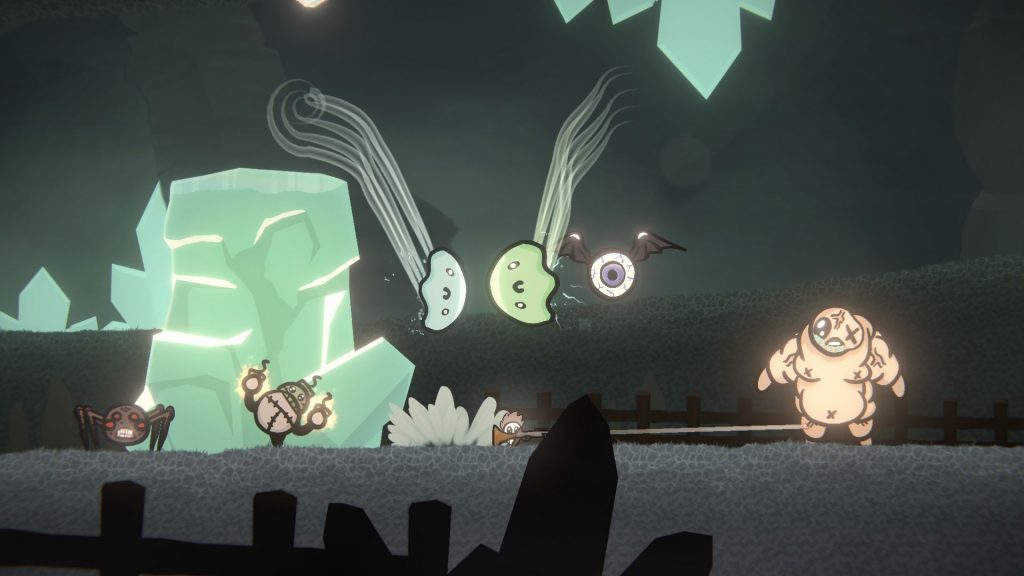TinyShot deserves a little bit more of an introduction than usual. This game is the debut of Allaith Hammed, a Syrian refugee who fled his home country for a new life in the Netherlands. There, he was able to pursue his life-long dream of game design, eventually getting signed on the spot by publisher Headup‘s CEO at an expo. Allaith is just nineteen years old, and has created TinyShot as a solo developer. With his inspiring story in mind, we’re going to be approaching this review a little bit differently, with more of a focus on directly constructive criticism (sorry, embittered long-term games critic snark. You’re going back in the cupboard for now).
This is a sidescrolling roguelike 2D shooter, the titular Tiny ploughing his way through the cartoonishly horrible denizens of the underworld with a metric ton of firepower. There’s a massive variety of enemy designs to face, with unique, huge bosses capping off every level, creating a fresh take on the David & Goliath myth every time. The levels play out as timed waves, giving Tiny a chance to power up and acquire new weapons before the big fights, picking up modifiers which affect gameplay in positive and negative ways.

When TinyShot gets into a flow, it feels great. The movement is primarily built around jumping, with a generous boost dash enabling Tiny to dart around the arena like a little superhero. It recharges fast enough to string together in mid-air, which is genuinely really fun when you get the hang of shooting at the same time. This flow is regularly interrupted by the need to pick up ammo, which doesn’t drop from fallen enemies, instead spawning more often than not at the opposite side of the map.
This regularly leaves the player in a state where they have to dash across the map, dodging enemies without much difficulty at all, with no direct offensive output along the way. Because of Tiny’s extraordinary mobility, it’s just a case of stringing together enough jumps to dodge all the monsters entirely, and that’s not particularly challenging or engaging. It’s a direct contradiction to the high-energy atmosphere the combat itself evokes, and staggers the levels considerably. Smaller ammo drops from kills would keep that energy going, and make TinyShot feel as intense as it wants to be.

The bossfights ramp up the difficulty quite significantly, and they’re definitely the moments where Allaith shows off the most of his talent. They’re big, bullet-hell-esque affairs against towering creatures, presenting insurmountable odds. TinyShot’s boss encounters will require a tight combination of skill, reflex and sheer dumb luck to overcome.
TinyShot lifts a lot of inspiration from the works of Edmund McMillen, following along as closely as possible to the big footprints left by Super Meat Boy and The Binding of Isaac. It imitates McMillen’s work very well – the artwork is scrappy but great, with a charming, Flash-like aesthetic which invokes a lot of nostalgia for the Newgrounds days of glory. The enemy designs mix goofy and grotesque in much the same way as Isaac did before it, and it’s clear Allaith has a ton of love and respect for the games that have inspired him.
I’m sure McMillen will be flattered to see his work motivating someone from such a difficult past to create, but if I could offer some sincere advice to Allaith, it would be to forge his own path. There are times where TinyShot‘s monsters are basically visually indistinct from Isaac enemies, and the line between “inspiration” and “derivative” shatters. There are glimmers of his own raw creativity that shine through TinyShot’s roughest edges, and it speaks volumes of promise.
TinyShot: A flawed but promising glimpse of potential
TinyShot is not all the way there as a concept. It’s fun, and Binding of Isaac fans might appreciate the same goofy gore aesthetic that characterises it, but it’s just a bit too raw to keep coming back to. The gameplay is gloriously frantic in short bursts, underscored by all too frequent breaks in the action which stop levels flowing as well as they could. But we should never discourage the inexperienced, or detract from their achievements during these first few big steps into the industry.
This is a game born of a special story, and Allaith has all the potential here to build upon. If he continues developing, continues learning and adapting as he already has, he has a very bright future ahead of him. Headup have given a spotlight to a small but deserving voice in the game development industry, and I really hope he makes the most of it.
Tinyshot was developed by Allaith Hammed and published by Headup. It’s available now on Steam. Check out more of our game reviews here!